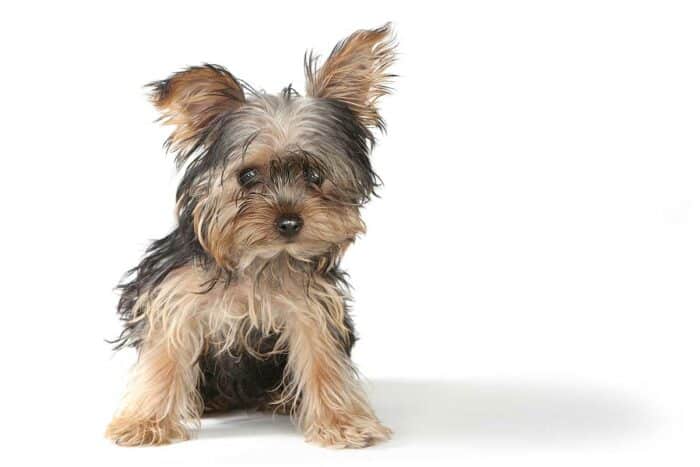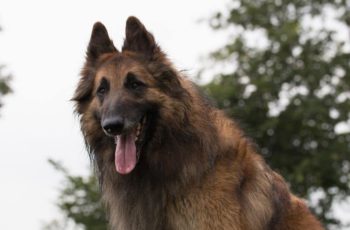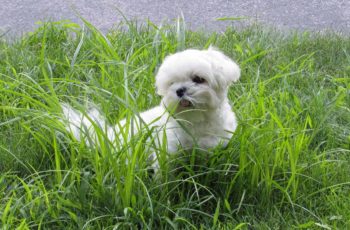This post may contain affiliate links. We may earn money or products from the companies mentioned in this post.
Yorkies are already one of the smallest dog breeds out there, weighing an average of just seven pounds, but you will also find even smaller versions of these fluffy little companion dogs.
These are known as teacup Yorkies because you guessed it, they can fit inside a teacup!
Teacup Yorkies are not a separate breed from Yorkshire Terriers, they are just Yorkies bred from small parents to produce small pups. They are relatively rare; because their size can come with a lot of health issues, many breeders just won’t breed them.

That said, if you are looking for a tiny companion dog that will love living in your apartment with you and can accompany you pretty much everywhere you go, all while being relatively low maintenance, the teacup Yorkie might be exactly the toy breed that you are looking for.
Read on as we go through everything you need to know about the teacup Yorkie to help you decide whether they are the right pup for you.
Vital Statistics
- Member of the Yorkshire terrier breed
- Weighs 2-4 pounds
- Measures 5-7 inches
- 7-9 year lifespan
- Suitable for apartment living
- Need lots of companionship
- Can be vocal
- Various health concerns associated with their small size
History Of The Breed
When Scottish workers began migrating to Yorkshire in England in the 19th century, they brought several varieties of terriers with them. These continued to be bred in the cotton and wool mills where these laborers worked.
Mineworkers also wanted to develop a ratting dog to work in the mines and started experimenting with terriers as well.
Workers united these two dogs to create the distinctive Yorkshire Terrier, and by 1878, they were recognized as a separate breed.
The definition of the breed was largely based on a show Yorkshire terrier called Huddersfield Ben, owned by a Yorkshire woman named Mary Ann Foster. George Earl painted a portrait of the dog in the 1890s.
The breed was already present in the United States in 1872 and the first Yorkshire terrier was registered with the American Kennel Club in 1885.
In the 1940s, Smoky became a famous war dog, accounting for the great popularity in the breed from that time forward.
While there have always been small Yorkies around, the trend for specifically breeding smaller dogs and marketing them as teacup Yorkies dates to the 1990s, as many “designer” dog breeds started to emerge.
Regardless of the marketing of these smaller pups, the teacup Yorkie is still part of the overall Yorkshire terrier breed.
We just use a specific name for the smaller pups that became popular among celebrities and models, and then made their way into many family homes.
Celebrities known to love tiny Yorkies include Gisele Bundchen, Kevin Jonas, Jay Mohr, Naomi Watts, Miranda Kerr, and Emmy Rossum.
Size
A teacup Yorkie will generally weigh a maximum of four pounds when they are an adult dog.
Anything larger, and they will be classified as a standard Yorkie, but breeders may also sell small Yorkshire terriers around the four-pound mark as standard Yorkies as well.
You can expect a Yorkie that weighs around four pounds to be between 5-7 inches tall, regardless of whether the breeder classifies them as a Yorkie or a teacup Yorkie.
Appearance
Teacup Yorkies look pretty much just like regular Yorkshire terriers, just on a smaller scale. They have a round head with a short muzzle and large dominant eyes that make them look a little bit like a teddy bear.
Notably, their eyes don’t protrude from their heads, which is a common feature of many other toy breeds.
While tiny in size, Yorkshire terriers were originally bred as working dogs so their miniature cousins have a sturdier body than many other small breeds.
You still need to be careful not to injure these little guys while playing with them, but they are nowhere near as fragile as many other toy dogs. They have short legs, which makes them appear more diminutive than they would otherwise.
There are only a handful of recognized colors for pure-bred Yorkies, and these colors carry through to teacup Yorkies. Your pup could be blue and gold, blue and tan, black and gold, or black and tan.
Not only may dogs with a different color coat not be pure-bred, but it can also be a sign of a genetic abnormality that may be accompanied by some problematic health condition.
Their coats tend to be low-shedding, but they grow quickly so they do need regular trims or their hair can become knotted.
Daily brushing will help remove debris and prevent matting. Try not to bathe them too often as this can undermine the natural balance of their hair and make it more difficult to care for properly.
Read our guide to how often you should wash your dog.
Temperament
While Yorkies are small in size, they are known to have large personalities and this is true of teacup Yorkies as well.
They are affectionate and love being around people. They will bond quickly with their family, and while they will usually bond with one family member above all others (usually but not always their principal caregiver), they have plenty of love to go around.
Prepare for them to be a bit attention-seeking as they like to be at the center of everything when with their families.
They are also known to suffer from isolation anxiety if they are left alone on a regular basis. They need human company and won’t thrive if they are left in the house for several hours a day while everyone is out at work.
This anxiety often results in destructive behavior, and you might be surprised at just how destructive such small dogs can be.
If you can’t take them to work with you, it is a good idea to have someone pop in during the day. Your Yorkie will be happy to have anyone around, even if it is not one of their people.
Teacup Yorkies tend to suffer from small dog syndrome and will act as though they own the street. They will bark at strangers and chase larger dogs and cats.
While this isn’t really anything to worry about, it can be frustrating to have them marking incessantly every time someone new turns up. Socializing them from a young age can help keep this behavior under control.
Teacup Yorkies can be difficult to socialize because of their small size, though, as it can be dangerous to let them lose with larger dogs. Even with friendly dogs, accidents happen and these pups are tiny!
The key to proper socialization is not to hold them all the time. This can reinforce their territorial nature and their aggression towards strangers.
When visiting with others, let them walk around and engage; they can always come back to your lap if they feel stressed or need a rest.
Since teacup Yorkies tend to be highly excitable, you will probably never be able to train them to stop barking completely, as it is an essential part of their particular personality. Their bark also tends to be louder than you might expect.
Energy Levels & Exercise
Teacup Yorkies have loads of energy and need much more exercise than you might imagine for their size. They do tire out quickly, but a 5-10 minute walk twice a day is ideal for formal exercise, in addition to giving them space to run around the house.
They will like to explore their home and play with toys. Since they were originally bred as ratters, they have a strong prey drive and love to chase and hunt.
Health Concerns
While Yorkies are generally healthy dogs, the small size of teacup Yorkies does introduce a few risks that pet parents should be aware of. Basically, they just weren’t meant to be this small and so it introduces a number of risk factors.
The first concern is that they are prone to injury. Their small size means that they just aren’t as durable as other animals and accidents that seem like nothing can cause your teacup Yorkie major issues.
Often accidents occur when children play with their “living teddy bears” and haven’t yet learned how to hold them gently.
Teacup Yorkies are likely to be sensitive to anesthesia, which can put their lives at risk when it is used.
Getting the dosage right for such a small dog can be a bit of a gamble, and the equipment used is not always the right size for them. Procedures requiring anesthesia are best avoided.
Their small, flat heads can put them at risk for dental disease caused by overcrowding of the mouth. The spacing of the teeth can lead to tartar build-up, which leads to gum infections over time.
If not treated, this can actually cause damage to your dog’s major organs as bacteria makes its way into the bloodstream. Regular teeth cleaning and trips to the doggy dentist are a must.
Read more about caring for your dog’s teeth here.
Their small size combined with a big appetite can also lead to obesity, which can put pressure on their joints and result in a variety of other issues. It is important to control their diet and watch their calories.
Don’t be tempted to feed them off your plate. Not only does this encourage begging behavior, but what may seem like a small morsel to you can be a big calorie hit for your tiny Yorkie.
Meals should be small and regular. Teacup Yorkies can be prone to hypoglycemia because they don’t have the muscle mass to store energy, so they need regular meals to maintain their energy and prevent spikes and drops.
Also, if they go too long without food they can have a seizure and fall into a coma.
Smaller Yorkies can also be prone to hypoplasia, which is when the vertebrae do not form properly. This can cause them great pain and eventually lead to spinal cord damage.
While reputable breeders will try and control for this, it is not always possible. Similarly, they may also develop a luxating patella, which is when the kneecap does not correctly fit into their femur. This can be painful and lead to frequent injuries.
Yorkies of all sizes can also be affected by portosystemic shunt. This is when blood skips the liver and is returned to the heart and other organs without being properly cleaned. This causes a buildup of toxins that can affect your dog’s organs in a variety of ways.
Like many small dogs, they can also develop tracheal collapse. This is especially common if they are walked on a leash, as it can put excessive pressure on their sensitive throats. They can develop difficulty breathing over time, which can become life-threatening.
Adopting A Teacup Yorkie
Many reputable Yorkie breeders won’t breed teacup Yorkies because of the various health concerns that accompany their small size. This means that it is not always easy to find a teacup Yorkie, and when you do they are likely to be very expensive.
It is also very important to do your due diligence on the breeder.
Buying from breeders that put the welfare of their animals at risk just encourages them to continue breeding, so while you might want to take them home and give them a better life, that can perpetuate a cycle of animal suffering.
Should I Adopt A Teacup Yorkie?
Having read our guide to the breed, are you considering adopting a teacup Yorkie? Consider the following to help you make your final decision.
What Is Your Home Like?
Teacup Yorkies are great for small homes as, for them, your apartment will probably seem like a palace.
They need lots of companionship, though. Is there generally someone at home or can they go to the office with you? Teacup Yorkies can develop depression if they are repeatedly left alone for long periods of time.
Also, consider who lives with you. Teacup Yorkies aren’t great dogs to have around younger children because they can accidentally hurt these fragile little pups.
Yorkies will also want to engage in rough play with larger dogs in the home, but can be easily hurt accidentally by the weight of the other dog.
Do You Have Experience With Dogs?
While teacup Yorkies are easy to control because of their small size, they aren’t easy to train if you want to teach them good behavior. They can be willful and they are natural barkers, and these are hard things to change.
While new owners can certainly handle a teacup Yorkie, you need an experienced hand to socialize and train them properly. Consider getting help from a professional if you are committed to this.
Do You Have An Active Lifestyle?
While your teacup Yorkie will want to go everywhere with you, even walks in the park can be challenging since they tire easily, and their small size means that even small obstacles can be insurmountable.
If you want to take them out and about with you, be prepared to carry them most of the time. Also, be aware that these dogs don’t tend to be fans of the water.
FAQs
How much does a teacup Yorkie cost?
Teacup Yorkies are relatively rare, so prepare for them to be expensive puppies. You might pay between $1,000-$3,000 for a puppy depending on where you are and the demand in your area.
Can you walk a teacup Yorkie?
You should walk your teacup Yorkie every day to give them the exercise that they need, but it is important to choose paths that they will be able to manage. Even jumping over a small log can be a big challenge for them. Try and choose easier, flatter paths.
Are Yorkies smart?
Yorkies are considered among the smarter dog breeds, but they also have a willful and rebellious streak that means they can be challenging to train.
The Verdict
Teacup Yorkies are a controversial dog, because they are bred principally for human aesthetics and not always with the best health of the dog in mind. They can be prone to serious health problems due to their small size.
Nevertheless, if you are looking for a loving companion to join you in your apartment for a pretty sedentary life, then a teacup Yorkie will make a happy addition to your home.
While they like to be around you all the time, they don’t need much space or exercise to be healthy and happy. Proper feeding and grooming mean that you and your teacup Yorkie can have a long and happy relationship.
If you do decide to adopt a teacup Yorkie, make sure you find a reputable breeder. Too many breeders use risky breeding methods to create more pups and make more money without considering the welfare of the dogs.
The only way to break this cycle is to stop the market for these pups.
Do you have experience with teacup Yorkies?
Share your thoughts with the community in the comments section below.
Save To Pinterest

Top Picks For Our Puppies
- BEST PUPPY TOY
We Like: Snuggle Puppy w/ Heart Beat & Heat Pack – Perfect for new puppies. We get all of our Service Dog pups a Snuggle Puppy. - BEST DOG CHEW
We Like: Best Bully Sticks – All of our puppies love to bite, nip, and chew. We love using Bully Sticks to help divert these unwanted behaviors. - BEST DOG TREATS
We Like: Wellness Soft Puppy Bites – One of our favorite treats for training our service dog puppies. - BEST FRESH DOG FOOD
We Like: The Farmer’s Dog – A couple months ago we started feeding Raven fresh dog food and she loves it! Get 50% off your first order of The Farmer’s Dog.
Check out more of our favorites on our New Puppy Checklist.


